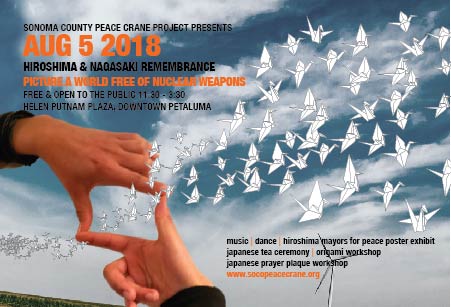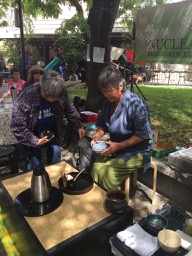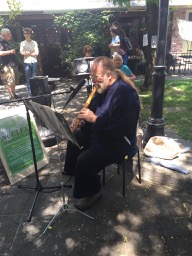Where: Helen Putnam Plaza, downtown Petaluma
When: August 5, 11:30-3:30 pm
Admission: free. donations appreciated

Many activities will be offered during the day: Interfaith opening prayer and incense offering; music performance by Elliot Kallen; dance performance by Ten Ten Taiko; Japanese Tea Ceremony by Sachiko Knappman; free origami workshop; Hiroshima Mayors for Peace Exhibit; Japanese Prayer Plaque Workshop (Ema); the folding of a 6’ origami crane; and an awards ceremony celebrating the high school and middle school winners of the Peace Crane Project’s youth poster art contest, with the theme, Picture a World Free of Nuclear Weapons.
This event occurs during this period of heightened tension and fear of nuclear war.
It commemorates the 73rd anniversary of the bombings of Hiroshima and Nagasaki, Japan.
The city of Petaluma is a member of Mayors for Peace since 2012. The Mayors for Peace, through close cooperation among the cities, strives to raise international public awareness regarding the need to abolish nuclear weapons and contributes to the realization of genuine and lasting world peace by working to eliminate starvation and poverty, assist refugees fleeing local conflict, support human rights, protect the environment, and solve the other problems that threaten peaceful coexistence within the human family.
Highlights of the event
Mayors for Peace Poster Exhibit on Atomic Bombings of Hiroshima and Nagasaki
Viewers will encounter terrible damage wrought on by the atomic bombing. “We hope this encounter will help you understand that nuclear weapons are absolute evil leading the human race toward extinction” wrote Matsui Kazumi, Hiroshima Mayor and Taue Tomihisa, Mayor of Nagasaki

Sachiko Knappman and Japanese Tea Ceremony
Japanese Tea Ceremony was developed into a spiritual practice in the mid 1500’s in Japan during the civil war period, which lasted almost 200 years. There was a strong Zen Buddhist influence on mindfulness and ritualistic movements that emphasized oneness with the present moment that was shared with a host and guests.
In Japan, tea made from this ritual is often used as an offering for temple altars and for the spirits of the deceased. Today we are honoring those who were impacted by the nuclear bombings, contamination and accidents.
Sachiko Knappman has been practicing tea ceremony as her spiritual practice for about 15 years and performs demonstrations at schools in Sonoma County.
Make an “Ema” – Peace Wishing Plaque
Ema draws on the Japanese tradition of creating a wooden prayer/wishing plaque
on which people write prayers or wishes, and leave them at shrines for kami (spirits) to receive them.
People are invited to write wishes for peace on the wooden plaques which will be displayed at future Peace Crane Project events.
The ultimate goal is to display them around a descendant of a tree that survived the bombing of Hiroshima.
Free origami workshop
Learn how to fold origami cranes.
When Sadako was only two years old, she was exposed to radiation from the atomic bomb dropped on Hiroshima, in Japan.
She attempted to fold 1,000 origami cranes in the 1950s, in hopes of recovering her health as she suffered from leukemia. Unfortunately, she was not able to finish folding a 1000 cranes but her classmates helped finish folding them for her. Since then, origami crane has become a symbol of peace, a prayer for a nuclear free world.
Award ceremony for the first annual Youth Art Contest
“Picture a world free of nuclear weapons”
Peace Crane Project organized the first annual youth art contest in hopes of engaging the younger generation in learning about nuclear issues.
Junior high and high school students’s art works were juried by a team of local art community including members of Peace Crane Project, Alchemia Gallery, artist Mario Uribe and John Bertucci of Fukushima Response/Petaluma Community Access Television. Winners will receive a cash prize.

Ten Ten Taiko
Sonoma County based group, Ten Ten Taiko will be performing a traditional Japanese drum dance performance
at the event. Ten Ten Taiko is led by Hiroko Honton.


Shakuhachi flute performance by Elliot Kallen
Initially trained as a concert pianist, Elliot Kallen migrated into the world of Rock and Jazz, playing keyboards for many bands and on many stages. A chance encounter led him to the Japanese bamboo flute. He is a long-time student of David Kansuke Wheeler of Boulder, CO. Elliot also studies with Kansuke’s teacher, Junsuke Kawase III, the third-generation head of Chikuyusha, the largest shakuhachi teaching organization of its kind in Japan. Elliot plays shakuhachi in a wide variety of contexts, from traditional Japanese music with koto and shamisen, to the exploratory sounds of the avant guard. He is also a founding member of TenTen Taiko, performing throughout the San Francisco Bay Area and beyond. Elliot is the current President of the International Shakuhachi Society (see www.komuso.com). He performs, teaches, and gives lectures on Japanese classical music and the shakuhachi from his home base in Northern California.
Carol Kawase, 6ft Origami Folding
Carol Kawase will be folding a giant peace crane with 6 ft square paper.
Elliot Kallen, Shakuhachi flute master
Elliot Kallen plays the shakuhachi, a traditional, end-blown bamboo flute from Japan. He is part of a lineage that has its roots in the music of the Komusō, the itinerant Zen monks who used the shakuhachi as a tool for meditation over 400 years ago. He frequently performs with shamisen and koto players showcasing traditional Japanese ensemble music and explores the use of the shakuhachi in a wide variety of non-traditional contexts. Elliot performs, teaches, and lectures about Japanese music regularly throughout the Bay Area and beyond.TenTen Taiko Lead by Hiroko Honton, Sonoma County’s TenTen Taiko has been performing together since 2006. TenTen, with one exception (the flute player), is an all-woman taiko group based in Petaluma. For today’s event they will perform a Kagura (Shinto ritual dance) that is rarely seen outside of Japan. In this piece, Ebisu (the god of fisherman), and his father, Daikoku (the god of prosperity), decide to go fishing. They perform a dance together, then offer treats and candy to the audience to curry good favor among the other gods that their fishing will be successful. Fukushima Response Fukushima Response will have an information table offering Geigercounter demonstrations.
